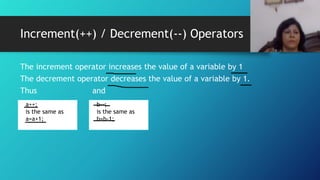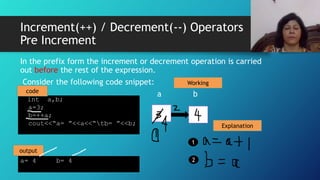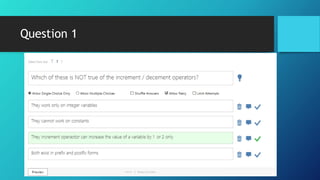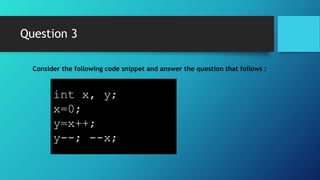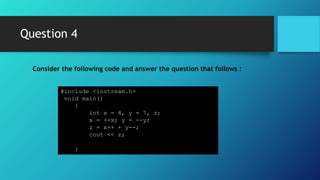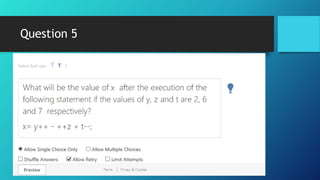Increment and Decrement operators in C++
- 1. C++ Increment / Decrement Operators Computer Science Class XI CBSE
- 2. Objectives At the end of this lesson students should be able to: Identify the increment/ decrement operators 1 Understand the working of the operators 2 Distinguish between the prefix and postfix forms 3 Evaluate different expressions containing these operators 4
- 3. How do they look like?
- 4. Increment(++) / Decrement(--) Operators The increment(++) and decrement(--) are unary operators that work only on integer variables. The syntax is : Examples: The increment / decrement operators do not work on constants. Thus : variable ++; or ++ variable; variable --; or -- variable; a++; ++ x; p=--q; t--; 6++; //gives error as 6 is a constant x=--9; // gives error as 9 is a constant
- 5. Increment(++) / Decrement(--) Operators The increment operator increases the value of a variable by 1 The decrement operator decreases the value of a variable by 1. Thus and a++; is the same as a=a+1; b--; is the same as b=b-1;
- 6. Both the increment and decrement operators can be prefixed or postfixed. i.e. In the above statements both prefix and postfix forms do not make any difference in the output as these are stand alone statements. But when the pre/post increment or decrement operators are part of an expression the prefix and postfix notation does matter Increment(++) / Decrement(--) Operators ++a; (prefix) is the same as a++; (postfix)
- 7. Increment(++) / Decrement(--) Operators Pre Increment int a,b; a=3; b=++a; cout<<“a= ”<<a<<“tb= ”<<b; In the prefix form the increment or decrement operation is carried out before the rest of the expression. Consider the following code snippet: a b a= 4 b= 4 1 2 output Working code Explanation
- 8. Increment(++) / Decrement(--) Operators Post Increment In the postfix form the increment or decrement operation is carried out after the rest of the expression. Consider the following code snippet: a b a= 4 b= 3 1 2 output Working Explanation code int a, b ; a=3; b=a++; cout<<“a= “<<a<<“tb= “<<b;
- 9. Thumb rule • Prefix: change and use CHANGE the Value of the variable USE the new value • Postfix : use and change • USE the original value of the variable • CHANGE the Value of the variable 1 1 2 2
- 10. Program to illustrate Increment, Decrement operators #include<iostream.h> void main() { int a,b,c,d; a = 0; b = 2; c = 4; d = a -- + b++ + ++c; cout<<“A= ”<<a<<“tB= ” <<b<<“tC= ”<<c“tD = "<<d; } A= -1 B= 3 C= 5 D= 7 0 2 4 a b c d d= a -- + b++ + ++c;
- 11. A video explaining the increment and decrement operators
- 12. TEST YOURSELF
- 13. Question 1
- 14. Question 2
- 15. Question 3 int x, y; x=0; y=x++; y--; --x; Consider the following code snippet and answer the question that follows :
- 16. Question 3
- 17. Question 4 Consider the following code and answer the question that follows : #include <iostream.h> void main() { int x = 4, y = 7, z; x = ++x; y = --y; z = x++ + y--; cout << z; }
- 18. Question 4
- 19. Question 5




